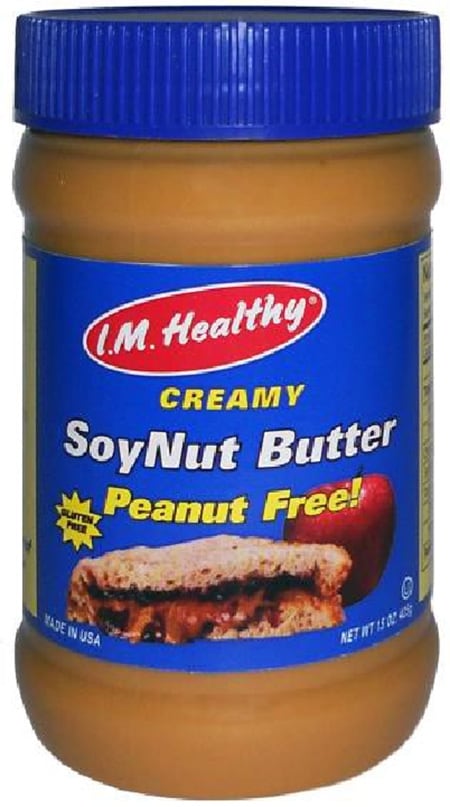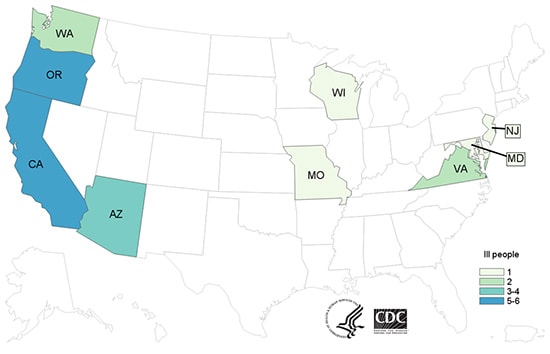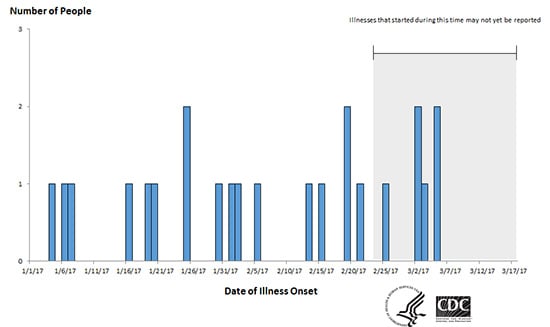Multistate Outbreak of Shiga toxin-producing Escherichia coli O157:H7 Infections Linked to I.M. Healthy Brand SoyNut Butter

Posted March 21, 2017 12:00 PM EST
What's New?
- Read the Recall and Advice to Consumers and Institutions >>
- Laboratory testing found the outbreak strains of STEC O157:H7 in I.M. Healthy brand SoyNut Butter collected from the homes of ill people and from retail locations.
- Seven more ill people have been reported since the last update on March 13, 2017. The most recent illness started on March 5, 2017.
- Two more hospitalizations and two more ill people with hemolytic uremic syndrome, a type of kidney failure, have been reported.
Highlights
- CDC, multiple states, and the U.S. Food and Drug Administration (FDA) are investigating a multistate outbreak of Shiga toxin-producing Escherichia coliO157:H7 (STEC O157:H7) infections.
- Twenty-three people infected with the outbreak strains of STEC O157:H7 have been reported from nine states.
- Ten ill people have been hospitalized. Seven people developed hemolytic uremic syndrome, a type of kidney failure, and no deaths have been reported.
- Twenty (87%) of the 23 ill people in this outbreak are younger than 18 years.
- Epidemiologic and laboratory evidence indicates that I.M. Healthy brand SoyNut Butter is the likely source of this outbreak. I.M. Healthy brand SoyNut Butter may be contaminated with E. coli O157:H7 and could make people sick.
- Laboratory testing found the outbreak strains of STEC O157:H7 in I.M. Healthy brand SoyNut Butter collected from the homes of ill people and from retail locations.
- On March 7, 2017, The SoyNut Butter Company recalled all varieties of I.M. Healthy SoyNut Butters and all varieties of I.M. Healthy Granola products. On March 10, 2017, The SoyNut Butter Company expanded its recall of SoyNut Butter products to include Dixie Diner's Club brand Carb Not Beanit Butter.
- CDC recommends that consumers do not eat, and childcare centers, schools, and other institutions do not serve, any variety or size of I.M. Healthy brand SoyNut Butter, I.M. Healthy brand granola, or Dixie Diner's Club brand Carb Not Beanit Butter, regardless of the date of purchase or the date listed on the container.
- Even if some of the product was eaten or served and no one got sick, throw the rest of it away. Put it in a sealed bag in the trash so that children, pets, or other animals can't eat it.
- This investigation is ongoing. CDC will provide updates as more information becomes available.
March 21, 2017
Case Count Update
Since the last update on March 13, 2017, seven more ill people have been reported from four states.
Twenty-three people infected with the outbreak strains of STEC O157:H7 have been reported from nine states. A list of the states and the number of cases in each can be found on the Case Count Map page.
Illnesses started on dates ranging from January 4, 2017, to March 5, 2017. Ill people range in age from 1 to 48 years, with a median age of 8. Twenty (87%) of the 23 ill people are younger than 18 years. Among ill people, 61% are male. Ten ill people have been hospitalized and seven people developed hemolytic uremic syndrome (HUS), a type of kidney failure. No deaths have been reported.
Illnesses that occurred after February 24, 2017, might not yet be reported due to the time it takes between when a person becomes ill and when the illness is reported. This takes an average of 2 to 3 weeks. Please see the Timeline for Reporting Cases of E. coli O157:H7 Infection for more details.
Investigation Update
In interviews, ill people or their family members answered questions about the foods they ate and other exposures in the week before they became ill. Twenty (87%) of the 23 people reached for interview reported either eating I.M. Healthy brand SoyNut Butter at home (14 people) in the week before they became ill, attending a facility that served I.M. Healthy brand SoyNut Butter (2 people), or attending childcare centers that served I.M. Healthy brand SoyNut Butter and I.M. Healthy brand granola coated with SoyNut Butter (4 people). SoyNut Butter is a nut-free substitute for peanut butter.
Investigators have reported to CDC two more ill people who either developed HUS or had a diagnostic test showing they were infected with STEC bacteria. In interviews, both of these ill people reported eating I.M. Healthy brand SoyNut Butter in the week before becoming ill. However, CDC is not including these people in the outbreak case count because no bacterial isolates, or samples, were available for DNA fingerprinting. Public health investigators use DNA fingerprinting to identify illnesses that are part of outbreaks.
Laboratory testing identified STEC O157:H7 in opened containers of I.M. Healthy brand SoyNut Butter collected from the homes of ill people in California, Oregon, and Washington. Officials in California also isolated STEC O157:H7 in unopened containers of I.M. Healthy brand SoyNut Butter collected from retail locations. Further testing using pulsed-field gel electrophoresis (PFGE) showed that the STEC O157:H7 in all of these containers of SoyNut Butter had the same DNA fingerprints as the STEC O157:H7 isolates from ill people.
The investigation is ongoing. CDC will update the public when more information becomes available.
























.png)











No hay comentarios:
Publicar un comentario